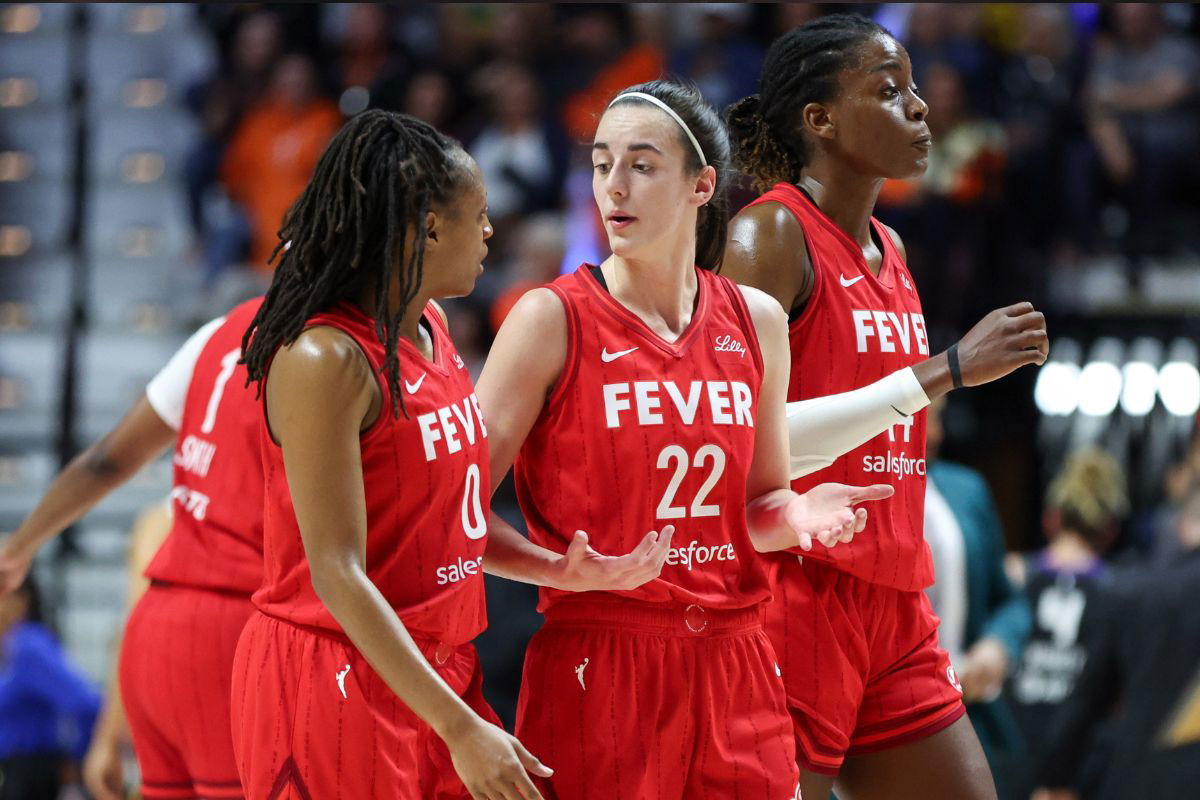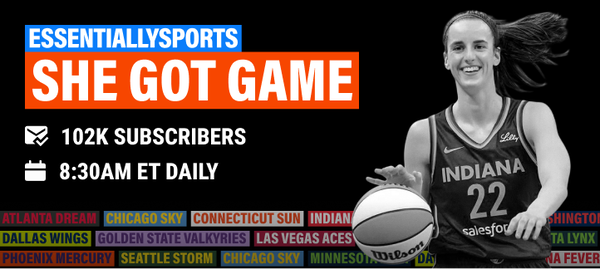
Imago
Sep 25, 2024; Uncasville, Connecticut, USA; Indiana Fever guard Caitlin Clark (22) talks to Indiana Fever guard Kelsey Mitchell (0) during the first half during game two of the first round of the 2024 WNBA Playoffs at Mohegan Sun Arena. Mandatory Credit: Paul Rutherford-Imagn Images WNBA Commissioners cup

Imago
Sep 25, 2024; Uncasville, Connecticut, USA; Indiana Fever guard Caitlin Clark (22) talks to Indiana Fever guard Kelsey Mitchell (0) during the first half during game two of the first round of the 2024 WNBA Playoffs at Mohegan Sun Arena. Mandatory Credit: Paul Rutherford-Imagn Images WNBA Commissioners cup

Imago
Sep 25, 2024; Uncasville, Connecticut, USA; Indiana Fever guard Caitlin Clark (22) talks to Indiana Fever guard Kelsey Mitchell (0) during the first half during game two of the first round of the 2024 WNBA Playoffs at Mohegan Sun Arena. Mandatory Credit: Paul Rutherford-Imagn Images WNBA Commissioners cup

Imago
Sep 25, 2024; Uncasville, Connecticut, USA; Indiana Fever guard Caitlin Clark (22) talks to Indiana Fever guard Kelsey Mitchell (0) during the first half during game two of the first round of the 2024 WNBA Playoffs at Mohegan Sun Arena. Mandatory Credit: Paul Rutherford-Imagn Images WNBA Commissioners cup
The WNBA follows the CBA. Just selectively, of course. Like the hard salary cap ($1,507,100 for 2025), that no franchise can escape from. Which even leads the squads to carry 11 players instead of 12 sometimes. Or the “prioritization rule” mandating that the players with 2+ years of service must report by training-camp deadlines or face consequences. So even when the result feels tone-deaf or unfair, the W follows the CBA to the letter.
Watch What’s Trending Now!
But when it comes to the promised prize money? Let’s just say the league knows how to loosen the grip there. Suddenly, things get flexible, fluid, and even fun. Let’s get this straight: according to the 2020 CBA, the total prize pool for the league’s “special competitions or tournaments” should be $750,000. So is the league going to pay that out? Not really, let’s break down the fine print that says “subject to league discretion”…
What is the WNBA Commissioner’s Cup?
The Commissioner’s Cup is basically the WNBA’s high-stakes, mid-season tournament. Since 2021, the teams have been battling it out in special conference matchups (five games for East teams, six for West teams due to the addition of Golden State Valkyries) that count toward separate Cup standings. The top team from each conference earns a shot at the one-game championship. That game is hosted at the higher seed’s home court around early July.
But here’s the cool part: every win also racks up cash for the local charities each team represents. It’s quick, it’s intense, and it gives those early-season games real stakes. It is like getting a postseason atmosphere months before the actual playoffs. This season, after a hard-fought (literally) victory against the Connecticut Sun, the Fever will play in the second-ever WNBA Commissioner’s Cup Championship Game. They will be going against the reigning Commissioner’s Cup champions Minnesota Lynx, who hold an 11-1 record, on July 1.
They earned their spot by defeating the New York Liberty and beating the Atlanta Dream on Tuesday. So as the Eastern Conference champions, they’ll now face off against the Lynx, who won the Western Conference portion of the competition. This also marks as Fever’s star guard, Caitlin Clark’s first shot at a WNBA trophy. “Yeah, I mean obviously, we’re excited. That’s a big deal. And obviously New York helped us out a little bit to get there,” Clark said about getting to the championship game, per an X post from Scott Agness.
Fever to play Lynx on 7/1 for the Commissioner’s Cup.
Caitlin Clark on advancing: “That’s a big deal. And obviously New York helped us out a little bit to get there. And it’s a hard thing to do and why wouldn’t we celebrate that? We’re getting to play for a pool of money.” pic.twitter.com/GJnddtmAlG
— Scott Agness (@ScottAgness) June 18, 2025
“And it’s a hard thing to do, and why wouldn’t we celebrate that? We’re getting to play for a pool of money, that’s pretty fun. And you’re competing to win a trophy.” She added with confidence, “It’s an extra game for us to get better, as well. So obviously, we celebrated it, and we’re proud of that.”
The Prize Money…
According to the WNBA’s official website, “The team from each conference with the top record in Commissioner’s Cup games will compete for a $500,000 prize pool in the Commissioner’s Cup Championship presented by Coinbase. In addition, Coinbase has committed $120,000 in cryptocurrency to the prize pool, which includes $5,000 for each player in the championship game.”
By comparison, each player on the winning team for Commissioner’s cup battle will receive $514,971. However, this move has been openly criticized by reputed media outlets and WNBA enthusiasts. Everyone needs an answer to just one question. “So, where is the other $250,000? Plus, crypto as prize pool money?”
The league announced the prize pool for the Commissioner’s Cup will be $500,000 this season, but the prize pool doesn’t match what the CBA calls for.
So, where is the other $250,000? Plus, crypto as prize pool money?
More from @MikeVorkunov ⤵️https://t.co/jawvPY8AFC pic.twitter.com/ZtASKvBlVu
— The Athletic (@TheAthletic) December 3, 2024
This kind of unfair treatment isn’t new. Women in sports keep getting the short end of the stick, and the pattern never changes. Tennis players fought for decades just to get equal Grand Slam prize money. The USWNT had to take their own federation to court for fair pay, even while consistently outperforming the men’s team. The pay gap is staggering. Today, the lowest NBA salary still dwarfs an entire WNBA team’s payroll.
These are systemic choices. Women athletes are expected to deliver championships while being told to accept second-class treatment across the board. This has to change soon.


